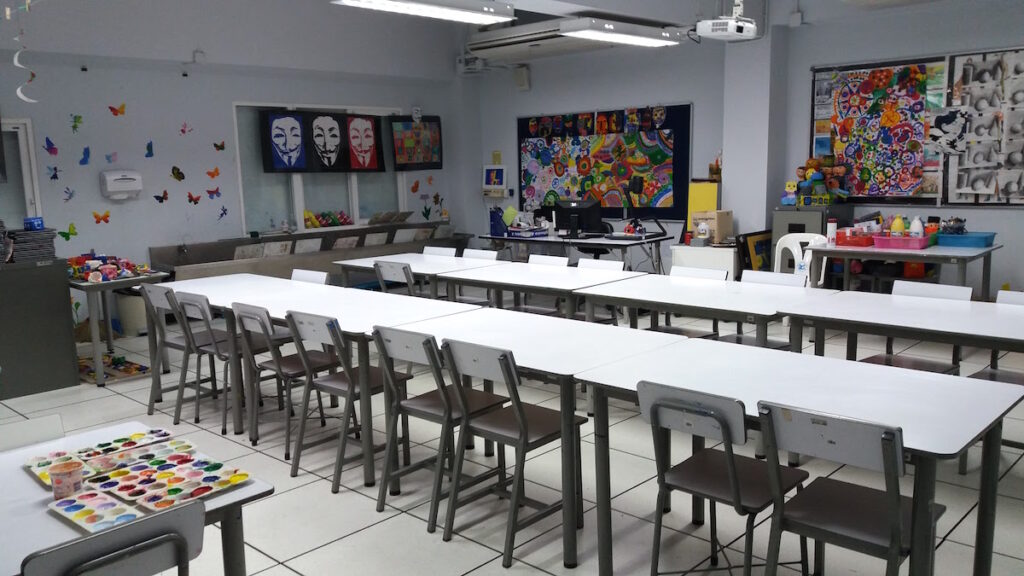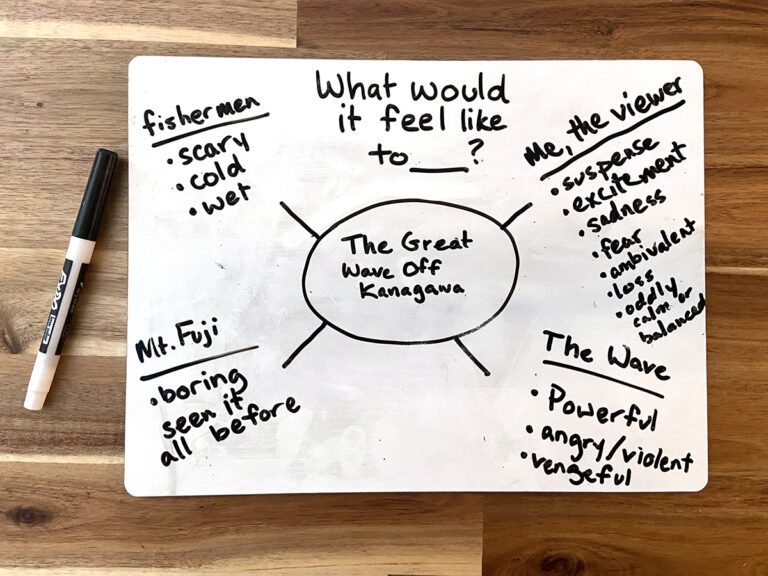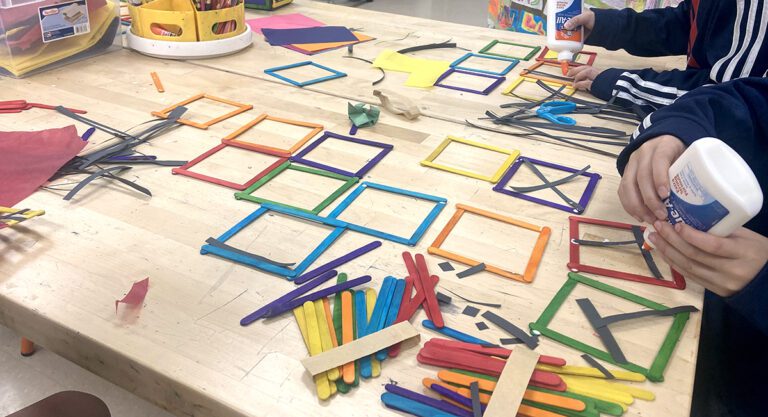Do you have “itchy feet”? According to Nora Graham, an art teacher working in Vietnam who has traveled and taught around the world, many art teachers do.
She describes it this way, “Art teachers tend to be lovers of life and adventure. We do what brings us joy. We are interested in art and culture. With these interests often comes itchy feet. Maybe you want to look the Mona Lisa in the eye, or SCUBA dive in the Indian Ocean, or watch hot air balloons fly over Bagan’s temples at sunrise. For these adventure-seeking, flexible, open-minded art teachers, teaching art overseas might be right up their alley.”

Many art teachers dream of traveling and teaching abroad. However, the logistics of actually doing so can feel overwhelming. That’s why we’ve tracked down three experts on this topic. Nora Graham, Skylar Fiske, and Nadia Al-Withaqui have all worked abroad and are sharing their thoughts with us here!
Here are 6 important pieces of advice if you want to teach overseas.
1. Begin the process early.
The first question most people ask is, “Am I even qualified to teach overseas?” Most often, the short answer is yes. Fiske, who has now taught in eight different countries, put it like this: “I had to answer two questions–do you have experience, and do you speak English? If you can answer yes to both of those, you are probably good to go.”
The advice that comes from all three? Begin the process early. In fact, start earlier than you think you need to. Hiring often takes place eight months (or more!) before you begin your new job.
There are many ways to go about things, but the typical process looks like this:
- Decide during the summer that you’d like to teach overseas.
- In November, have your resume, references, and portfolio ready.
Some schools will already be hiring for the following school year. For this reason, you may want to consider signing up for a job fair through a major recruiting agency. (More on this topic in tip 2.) - In December, start applying directly to the job openings being posted.
Remember these openings will be for the following school year. You can apply to these openings directly or through your recruiting agency. - Continue to look for openings past December.
Some international schools allow teachers to give notice in February, so jobs will continue to be posted.
2. Consider recruiting agencies.
Recruiting agencies can be expensive, but they can also be a worthwhile investment. The most popular agencies are Search Associates, ISS, and GRC. Other affordable and valuable resources to check out are TIE Online and Joy Jobs. It can cost hundreds of dollars to register with these agencies. However, the information you get from doing so can be priceless. For example, after you register you will be able to access all of the schools’ information, including what types of packages they offer to teachers. In addition, it will give the schools access to your information when they are looking for applicants.

Furthermore, if you go through an agency, you will likely get an agent who will advise you. Your file is open for two to three years or until you get a job.
All that said, don’t panic if you can’t or don’t want to go through an agency. Times are changing quickly in the hiring world, and it’s never been easier to apply directly to the schools you like. Fiske echoed this sentiment saying, “When I first came overseas, I went through ISS. But, now that I know the process, it’s easier to go it alone.”
3. Research to find the right fit.
Finding a good placement takes a lot of research and a little risk-taking. It can be fun to dream as you dig into different ideas and decide exactly what you want. However, no matter how much research you do, there’s no guarantee you’ll end up in the perfect placement. You are still taking a chance.
Graham said her first experience was a bit nerve-wracking to start, but she ended up somewhere amazing. “I went to my first overseas teaching position in Dhaka, Bangladesh, with only my suitcases, ready to bolt if things went bad. I stayed for three years. Three years that I value and treasure. It was an amazing experience with wonderful, caring students in a fascinating country. I had never pictured myself living there, but it is an experience that will forever be a part of who I am and how I see the world.”

When researching, don’t forget to look into the country’s culture and political climate. In school, you’ll generally be safe and only deal with the same concerns you would anywhere. But when you are off campus, experiences can vary wildly.
Is religious expression important to you? Does how you identify clash with societal norms in a way that could put you in danger? Do you know how welcoming a culture generally is of differences? It’s unfortunate that anyone should have to consider questions like these, but the reality is your safety should come first. You can and should ask questions about these types of issues to open up an honest discussion between you and the school. It’s important for both parties to find the right fit.
4. Find a school that will provide help and support for your relocation.
“Good international schools will help you with the relocation process,” Graham said. “They should provide housing and other benefits for you, including health insurance and regular flights home.”
In other words, if you come across a school that says you’re on your own, it’s a big red flag. When you are researching schools, gather all the information you can. In addition, be sure to look at the school’s guidelines. Some schools only hire people without dependents, while other schools will welcome full families.
When you first arrive in a new country, it’s normal to feel a little out of your depth. It’s a new place you likely haven’t been to before. It looks different, smells different, and feels different. It is a significant transition for you, and likely for your family as well. A few weeks into the experience you will begin to embrace the culture.
5. Consider how your work will be valued and compensated.
Just like in the United States, art teachers abroad have a variety of experiences when it comes to how much the arts are valued in school. Graham said she’s been impressed with how international schools value art education. On the flip side, Al-Withaqui said her work is still seen as secondary to that of more traditional core classes. And, no matter how far you go, you may never escape the dreaded poster request.

Fiske summed it up nicely when she said, “Every place is different. I’ve been in countries where I am a well-respected professional who was trusted to design my entire curriculum. I’ve also been in countries where my work wasn’t valued at all.”
In terms of pay, most teachers find that compensation overseas is favorable to what they would make in the United States. Of course, pay will vary from country to country and school to school, so be sure to check during your research phase.
You’ll also want to consider things beyond your salary like taxes and health care. Al-Withaqui, who teaches in Kuwait, shared these thoughts on the subject: “One of the best parts of teaching overseas is that your income is usually tax-free. And, in general, things such as health care, food, and everyday items will be cheaper.” Add in other potential perks like paid maternity leave and raises based on performance, and you can be looking at a solid financial opportunity.
6. Embrace the challenge!
Finally, all three teachers were incredibly encouraging, speaking highly of their time spent overseas. Fiske said, “Do your research, find the right fit, and you will love every minute. My time teaching overseas has been some of the best years of my life.”
And, if you need even more inspiration, check out our Teaching Art Around the World Series where we profiled teachers living in Norway, Thailand, Ethiopia, India, Germany, and South Korea!
In short, if you are willing to be flexible and expect the unexpected, teaching overseas can be the experience of a lifetime. Take the time to research and ask the right questions to see if you can find a fit that’s right for you. If you decide to make the leap, you’ll gain invaluable cultural and teaching experiences. Not to mention a lifetime of stories to tell. That alone can make your years abroad worthwhile.
Have you ever considered teaching overseas?
What other questions do you have about teaching in another country?
Magazine articles and podcasts are opinions of professional education contributors and do not necessarily represent the position of the Art of Education University (AOEU) or its academic offerings. Contributors use terms in the way they are most often talked about in the scope of their educational experiences.





